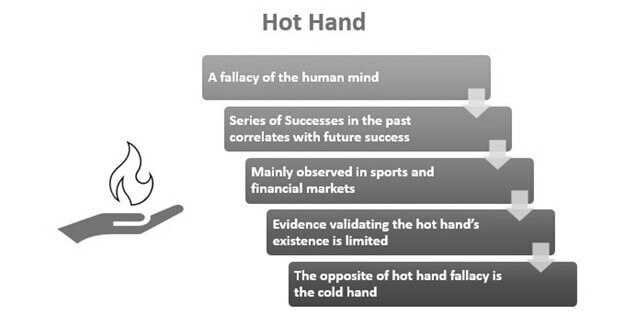Introduction
In the realm of decision-making, humans often succumb to cognitive biases that lead to irrational judgments and faulty reasoning. One such prevalent mental model is the Hot Hand Fallacy. It refers to the mistaken belief that a person’s success in a particular endeavor, such as sports or investing, is likely to continue in a streak or pattern. Anchored in human psychology, the Hot Hand Fallacy has profound implications for decision-making processes in various domains of life. In this blog post, we will explore the Hot Hand Fallacy, its relevance in decision-making, examples of its occurrence, underlying biases, strategies to identify and avoid it, and the significance of being aware of this mental trap.
Understanding the Hot Hand Fallacy
The Hot Hand Fallacy gained widespread attention in the early 1980s through basketball research conducted by psychologists Thomas Gilovich, Robert Vallone, and Amos Tversky. They found that despite statistical evidence to the contrary, basketball players and fans believed in the existence of the “hot hand” – a streak of successful shots. However, further analysis revealed that success in basketball, like many other domains, is largely influenced by random fluctuations rather than a consistent hot hand. The fallacy arises from a cognitive bias that leads individuals to perceive patterns where none actually exist.
Prevalence in Daily Life
The Hot Hand Fallacy extends beyond sports and permeates various aspects of our daily lives. Consider a scenario where a person invests in the stock market based on a series of successful trades. Believing in a hot hand, they continue making investment decisions without proper analysis, assuming that the streak will continue. Similarly, in personal life, individuals may base their career choices or relationship decisions on a perceived streak of success without considering other relevant factors. The Hot Hand Fallacy can also influence public policy-making, where officials may allocate resources based on past successes without critically evaluating the underlying factors contributing to those outcomes.
Examples of the Hot Hand Fallacy
- Personal Life Decisions: Imagine a person who has experienced a series of successful job interviews. Believing in a hot hand, they may make impulsive career choices without thoroughly evaluating the long-term prospects or compatibility with their skills and interests. This fallacy can lead to suboptimal career decisions that may not align with their true aspirations.
- Business Scenarios: In the business world, the Hot Hand Fallacy can lead to irrational decision-making. For example, a company that has achieved a string of successful product launches may assume they have a “golden touch” and become overly confident in their future endeavors. This overconfidence can result in neglecting proper market research, leading to failed product launches and financial losses.
- Public Policy-Making: The Hot Hand Fallacy can impact public policy decisions, particularly in allocating resources. If a government invests heavily in a specific sector based on previous success without considering changing market conditions, it can result in misallocation of resources and missed opportunities for more impactful investments.
Biases Contributing to the Hot Hand Fallacy
Several cognitive biases contribute to the occurrence of the Hot Hand Fallacy
- Availability Bias: The availability bias occurs when individuals make judgments based on readily available information or recent events. When experiencing a streak of success, this bias leads individuals to overestimate the likelihood of continued success due to the vividness and ease of recalling recent positive outcomes.
- Confirmation Bias: Confirmation bias plays a role in the Hot Hand Fallacy by causing individuals to seek and interpret information that confirms their beliefs in a streak or pattern of success. They may selectively remember and emphasize instances that support the hot hand hypothesis while ignoring contradictory evidence.
- Gambler’s Fallacy: The Gambler’s Fallacy is the erroneous belief that past events affect the likelihood of future independent events. In the context of the Hot Hand Fallacy, individuals may assume that a series of successful outcomes increases the chances of continued success, despite each event being independent and unaffected by previous outcomes.
Identifying and Avoiding the Hot Hand Fallacy
- Examine the Evidence: To identify the Hot Hand Fallacy, individuals should critically evaluate the evidence supporting a streak or pattern of success. Look for larger sample sizes and consider statistical analysis to determine if the observed success is statistically significant or simply the result of random chance.
- Embrace a Long-Term Perspective: Taking a long-term perspective can help individuals avoid the Hot Hand Fallacy. Recognize that success or failure in a few instances does not necessarily indicate a streak or pattern. Evaluate performance over a larger timeframe to gain a more accurate understanding of the situation.
- Seek Diverse Perspectives: Engage with others who may offer different viewpoints and challenge the notion of a hot hand. Seek feedback and advice from trusted individuals who can provide objective assessments, helping to counteract personal biases and assumptions.
- Rely on Data and Analysis: When making decisions, rely on data-driven analysis rather than subjective interpretations. Incorporate objective measures, conduct thorough research, and consider a variety of factors beyond the perception of a streak to make well-informed decisions.
Conclusion
The Hot Hand Fallacy is a cognitive bias that can significantly impact decision-making processes across personal, business, and public policy domains. By understanding the psychological underpinnings of this fallacy, individuals can identify when they are susceptible to the allure of streaks and patterns. Avoiding this mental trap requires critical thinking, a long-term perspective, and a reliance on data and analysis. By actively challenging the Hot Hand Fallacy, individuals can make more objective decisions that are in their best interests and avoid the pitfalls of relying on illusory streaks of success.
